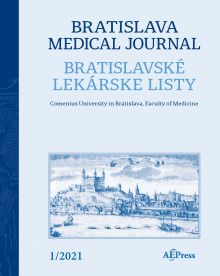Journal info
|
||||
Select Journal
Journals
Bratislava Medical Journal 2024 2023 2022 2021 2020 2019 2018 2017 2016 2015 2014 2013 2012 Ekologia - Ecology Endocrine Regulations General Physiology and Biophysics Neoplasma Acta Virologica Studia Psychologica Cardiology Letters Psychológia a patopsych. dieťaťa Kovove Materialy-Metallic Materials Slovenská hudba 2025Webshop Cart
Your Cart is currently empty.
Info: Your browser does not accept cookies. To put products into your cart and purchase them you need to enable cookies.
Bratislava Medical Journal Vol.122, No.7, p.461–468,2021 |
||
| Title: Analysis of clinical efficiency and early postoperative complications after cranioplasty | ||
| Author: M. Hanko, K. Cmarkova, R. Hanzel, P. Snopko, R. Opsenak, B. Kolarovszki | ||
| Abstract: INTRODUCTION: Despite of being considered a routine procedure, cranioplasty is associated with a substantial risk of failure, or postoperative complications. PATIENTS AND METHODS: Postoperative clinical course and rate of complications was assessed in patients undergoing cranioplasty during years 2015–2019 in a retrospective fashion. RESULTS: The most frequent condition requiring cranioplasty was a presence of bone defect after a decompressive craniectomy for traumatic brain injury (45 patients). Revision was needed in 9 cases (12.68 %), removal of the bone flap was necessary in 5 patients (7.04 %). The most common complication observed was an unintended intraoperative durotomy, occurring in 9 patients (12.68 %), which was, however, not associated with an increased risk of reoperation. Postoperative improvement of motor functions was observed in 7 patients (9.86 %). Improvement of consciousness occurred in 8 patients (11.27 %). Early cranioplasty was associated with significantly higher odds for surgical revision, patients after previous craniectomy for traumatic brain injury had significantly increased odds for the overall occurrence of complications. CONCLUSIONS: After a cranial reconstruction, complications with a various degree of severity may occur and even the result in need of the implant removal. Postoperative improvement of focal neuro-deficit is possible as well as improvement on the level of patient’s consciousness (Tab. 2, Fig. 2, Ref. 61). |
||
| Keywords: cranioplasty, craniectomy, outcome, complications | ||
| Published online: 23-Jun-2021 | ||
| Year: 2021, Volume: 122, Issue: 7 | Page From: 461, Page To: 468 | |
| doi:10.4149/BLL_2021_076 |
||
|
|
 download file download file |
|

